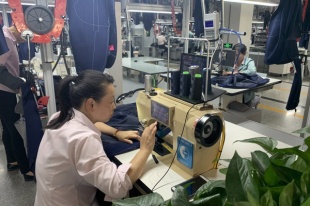Rag trade a rich seam for Ningbo


According to Li, Youngor aims to cut back on real estate and investment to focus more on improving its core competitiveness.
Local automated sewing and intelligent knitting machinery suppliers such as Supreme and Cixing are also contributing to this industrial upgrading process.
Cixing has developed a flat knitting machine using 3D technology that can create a piece of seamless knitwear from colored yarn instead of the old method that needed several parts to make one sweater. A simply patterned item of knitwear can be made in an hour this way.
The company is also establishing a customer-to-manufacturer platform, which will connect its smart knitting machines with the internet of things and other industrial internet technology to provide support.
Major garment manufacturers in Ningbo today are more aware of the added value their brands and designs can potentially bring.
Romon Group, a leading domestic menswear manufacturer, has opted to explore international markets with its own brand, starting with Southeast Asia, chairman Sheng Jingsheng says.
The majority of its sales come from its 1,000-plus offline outlets and from online platforms like Taobao, JD and vip.com. It also produces around one million customized uniforms annually for different vocations, which accounts for around 20 percent of its revenue.
Having produced goods for foreign companies to sell under their own names for the past 30 years, the group is developing a midprice range for women. The company plans to approach internet celebrities and cooperate with big-name global designers to expand its brand visibility.
Another local enterprise, the Beyond Group, turned its idle workshops into an incubator for garment and internet startups.
So far, 63 companies have been set up there, including nine clothing brands-seven of which achieve annual sales of 100 million yuan each. The group is also looking into seed and angel funding.
By doing so, Beyond Group chairman Rong Juchuan has successfully redefined his company as a platform for innovation instead of a garment and textile company.
While Ningbo may not be as well known for nurturing design talent as major cities like Beijing or Hangzhou, the company is setting up internships for university and vocational school students.
The group is also exploring ways to expand their product ranges, by exploring niche markets like denim wear for motorcycle lovers, after successfully developing a range of lounge wear.
Some firms prefer to tap the potential of international markets. Zhou Huiming started his cashmere fabrics business focused on the North American market in Canada in 2003 and later entered the garment retail field after purchasing a local brand there.
In 2007, Zhou returned to his hometown of Ningbo and founded Yachu Fashion Co Ltd, establishing him as a garment manufacturer. In 2012, he finally started his own suit brand Nikky based in New York. Zhou and renowned Italian tailor Francesco Pecoraro plan to launch a tailoring school to leverage Pecoraro's technical know-how.
The future of the textile and garment industry in Ningbo depends on innovation in technology, management and ideas, says Yang.
And according to Ningbo's Party secretary Zheng Zhajie, the city's fashion, textile and garment sector is one of the key industrial clusters that the city is aiming to cultivate through investment over the next six years.
Contact the writer at fangaiqing@chinadaily.com.cn





































